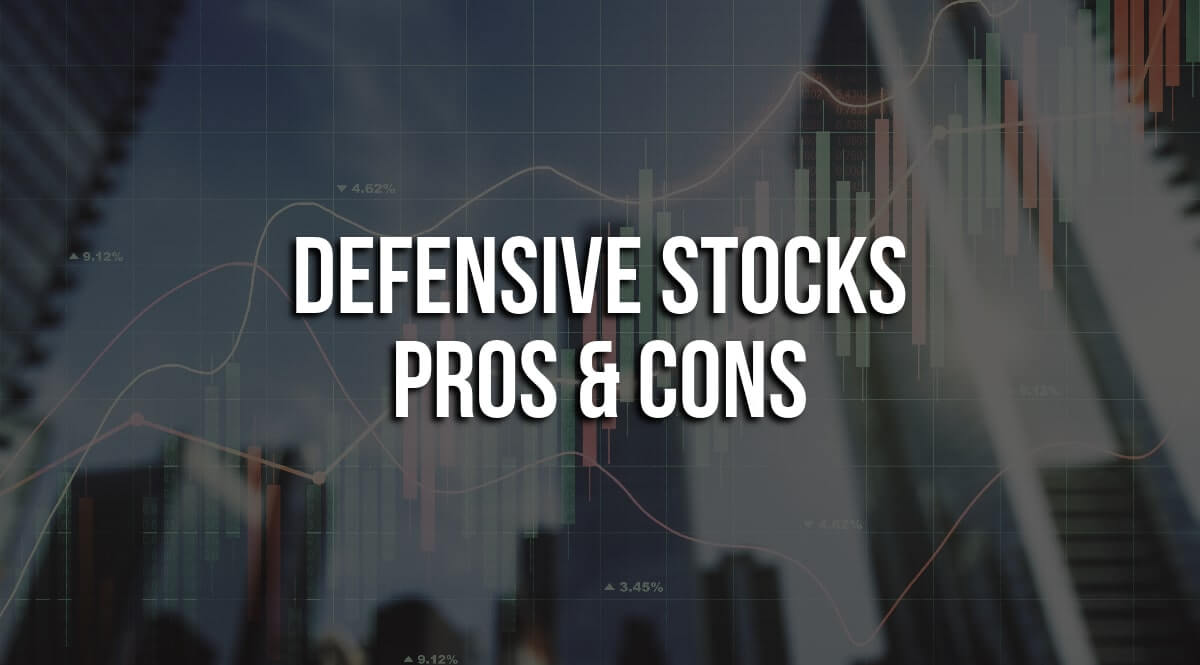
What are defensive stocks – Pros & Cons
Defensive stocks are more resilient to bear markets, crises and stock market crashes. Less volatile than the average, these stocks therefore allow your stock market portfolio to cope with economic downturns by limiting capital losses. They are a kind of safe haven for investors and they offer steady returns.
How to select this type of stocks? There are several types of defensive actions and therefore several criteria that allow them to be identified.
- High dividend stocks – stocks with high dividend yields
A first category of defensive stocks is those whose dividends are high and regular. We’re talking about dividend investing. To spot these stocks, take those that have:
- Stable or growing profits for several years;
- A balanced dividend/profit ratio;
- A good yield (ratio between the dividend per share and the share price).
In the event of a market decline, if the price of one of these shares falls, its return will become very high. It will therefore become a preferred target for investors with cash to invest. Its price will therefore mechanically recover.
For this to be valid, the company must not reduce its dividend too much during times of crisis. This is why the proportion of profits it pays out must be neither too low (so that the dividend is substantial), nor too high (so that the company can continue to pay a dividend even if its activity slows down). Aim for a dividend/profit ratio of around 50%.
Investing in defensive stocks on the stock market: significant stability

The stock’s volatility worries many investors. When economic conditions deteriorate, investors rightly tend to turn to more defensive stocks.
Defensive stocks are stocks that are considered safer and more stable. They may not offer the same earning potential as growth stocks, but they have the advantage of being positioned in sectors essential to the economy, even in times of economic slowdown or crisis.
These sectors are generally consumer staples, utilities like water electricity or healthcare, which perform well in virtually all economic conditions.
For those who want to diversify their portfolio in the defensive stock sector, you can also opt for defensive ETFs.
What are the best defensive stocks on the stock market?
We have selected 10 stocks from all the defensive stocks in the world, trying to diversify the geographical sector as well as the sector of activity as much as possible. This is why there are a few European stocks among a majority of American stocks (which are much more numerous).
These are some of the best defensive stocks on the market for investors looking to protect their portfolios from current and future turmoil.
Our selection is based on several criteria such as: trading volume, liquidity of the security, market capitalization, financial statements, potential of the stock but also popularity among investors. All this while taking into account the geographic and sectoral diversity of the actions.
These criteria are obviously not sufficient to carry out an in-depth analysis of the stock, nor to make a long term investment decision. Always do your own research before investing in a stock, this list is only to give you ideas and examples of values.
The list of the best defensive stocks includes:
- Walmart (WMT)
- Nestle (NESN)
- Procter & Gamble (PB)
- AbbVie (ABBV)
- Costco (COST)
- Coca-Cola (KO)
- Unilever (ULVR)
- L’Oreal (GOLD)
- Colgate-Palmolive (CL)
This list is given for information purposes, in order to help you discover values and give you ideas. There are indeed many other defensive actions. To find the one that suits you best, complete your research.
The types of defensive stocks

There are three main categories of companies listed on the stock exchange:
Growth companies, which have growth profiles, adopt strategies to increase their turnover and profits. They are found in particular within the Tech, digital and even e-commerce sectors.
Cyclical companies, whose performances are correlated with the economic cycles of their sectors of activity, are well represented in the automobile, construction and even the oil sectors.
So-called defensive companies are less sensitive to economic conditions and therefore more robust in the event of a deterioration in macroeconomic indicators.
Defensive stock sectors on the stock market
A defensive stock is a share of a publicly traded company belonging to an industry sector that is resilient in the event of unfavorable economic conditions.
The principle of a defensive value is therefore to cushion bearish stock market cycles. On the other hand, they will (generally) not capture the same upward amplitudes during favorable economic phases.
Investing in defensive stocks can be considered as investing in the stock market “as a good father”.
The agri-food sector
Food production and processing plants upstream of mass distribution are necessary to feed populations. This sector meets a primary need and is therefore an “anti-crisis” sector due to its recurring nature.
The mass distribution sector
This sector is by nature defensive, particularly the large food distribution and hygiene products sector. Indeed, it meets the daily primary needs of people.
It is possible to add the distribution of fuels, necessary for the mobility of the majority of vehicles. Be careful, however, it is important to differentiate the distribution of fuels to individuals and companies from the oil sector as a whole (in particular production), which is very cyclical.
The housing sector

Although construction (Building and Public Works) as a whole remains a cyclical sector, the housing needs of the population are primary needs. Note, however, that few companies are listed on the stock exchange in the category of listed real estate companies specializing in rental housing for individuals.
This is explained by the fact that the housing economy is mainly focused on the private market (tenant/owner), as well as transactions between individuals in old real estate. Some companies listed on the stock exchange are present in the real estate development sector for new housing, but the majority of builders are private entities (particularly in France).
Note that this sector of new housing promotion remains cyclical even if it meets a primary need: housing. This can be explained by the correlation between the strength of the economy and the decision to purchase new real estate.
The community services sector
Also called “Utilities”, community services include the delivery of electricity, water and even gas, necessary for the needs of millions of homes, companies and industries.
The health sector
Health care is also one of the primary needs: taking medications, consultations and medical procedures, but also caring for seniors, are the core business of major defensive stocks in the health sector.
The health sector is therefore defensive provided that certain branches such as biotechnology or research are excluded. Also note that hospitals and clinics are public or private establishments, not listed on the stock exchange.
These five sectors: agri-food, mass distribution, housing, community services, and health are intrinsically defensive because they meet the majority of the primary needs of populations.
However, it is necessary to apply certain filters within the “subsectors”. Thus, as we have seen in the health sector, the biotechnology sector should be excluded from the defensive category.
The same goes for large retailers which offer prestigious wines for sale. This branch of luxury oenology cannot of course be considered as a defensive “sub-sector”.
There are also “second tiers” within the defensive sectors. These are numerous branches of non-essential activity (i.e. they do not satisfy primary needs) but whose consumption can be considered constant, regardless of the economic context. We will think, for example, of the beauty sector or even of vision EssilorLuxottica is a large group manufacturing ophthalmic glasses and lenses that are among the world leaders.
It should also be noted that certain sectors are the opposite of the defensive category, such as luxury boating, or even start-up companies specializing in the design of high-tech products, for example.
The advantages of investing in defensive stocks

The main advantage of investing in defensive stocks lies in the ability to cushion bearish stock market cycles when economic phases are more complex.
Other advantages of defensive stocks are that they are often companies that are mature in their markets and pay regular dividends.
Also read our article Discover our TOP 15 companies with the highest dividends
The disadvantages of investing in defensive stocks
It is undeniable to say that the performance of defensive stocks is in no way comparable to growth stocks or cyclical stocks during recovery phases. These can offer the investor high returns while defensive values will remain more timid during favorable economic and stock market periods.
The main disadvantage of investing in defensive stocks is therefore to deprive yourself of notable upward performances when the economic cycle is favorable.
The low volatility of defensive stocks often leads to smaller gains during bull markets and a cycle of mistiming the market. Unfortunately, many investors abandon defensive stocks out of frustration with underperformance late in a bull market, when they really need them most. After a downturn in the market, investors sometimes rush into defensive stocks, even though it is too late. These failed attempts at market timing using defensive stocks can significantly lower the rate of return for investors.




